Violence rocks Haiti as prime minister visits Kenya
By Adongo Ogony March 5, 2024
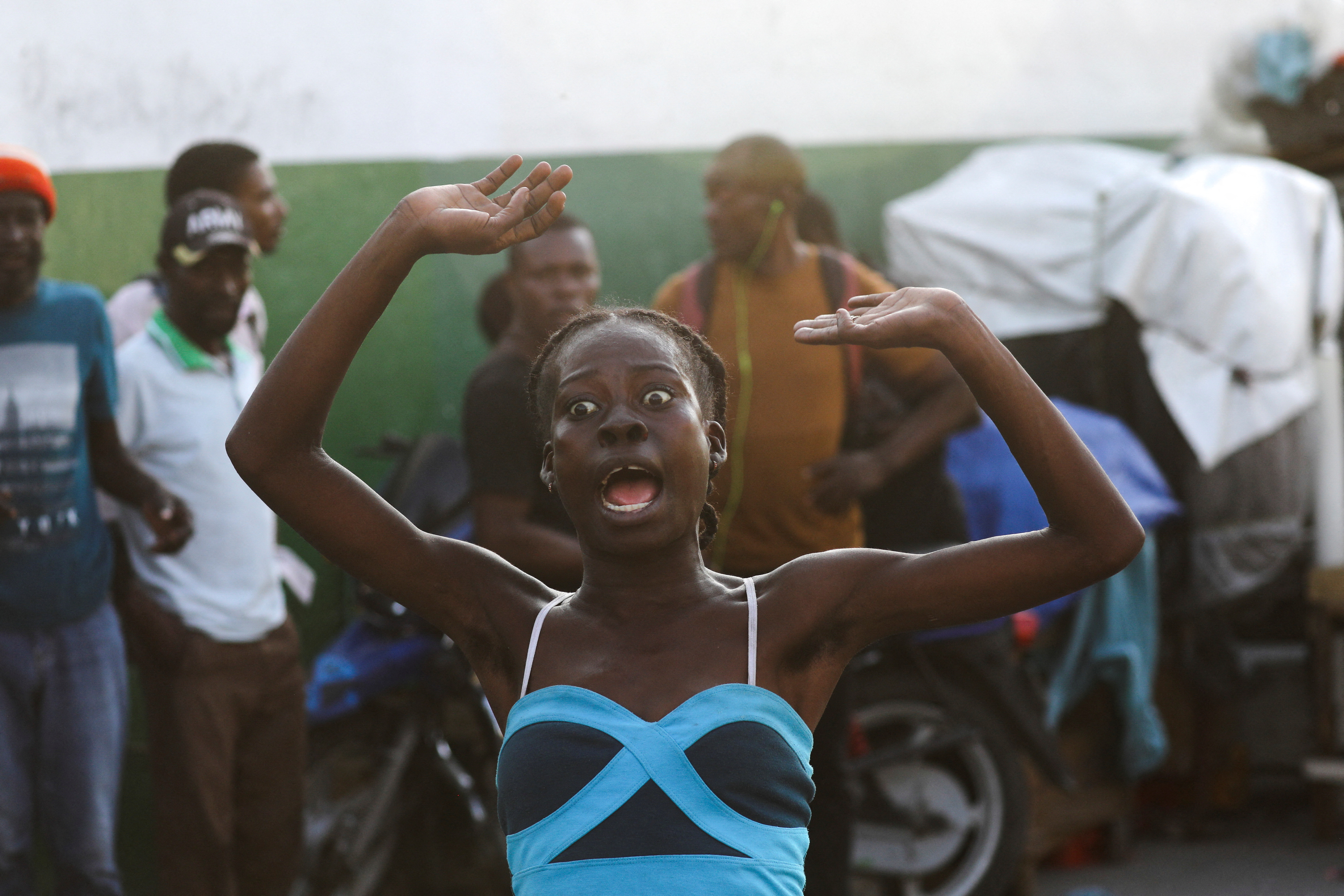
A woman reacts while fleeing her home as police confront armed gangs after prominent gang leader Jimmy Cherizier called for Haiti’s Prime Minister Ariel Henry’s government to be toppled, in Port-au-Prince, Haiti, February 29, 2024.
PORT-AU-PRINCE, Feb 29 (Reuters) – A wave of panic swept through downtown Port-au-Prince on Thursday as violence and heavy gunfire broke out, in what a gang leader said was a demonstration against authorities.
The armed clashes involving gangs, police and vigilantes took place on the same day Haiti’s Prime Minister Ariel Henry arrived in Kenya for talks on the deployment of a multinational security mission in the country backed by the United Nations.
By midday, most institutions and businesses in the city had closed and thousands of people were trying to flee the downtown area on foot or public transport, witnesses said.
Special police units were deployed throughout the city and national police trade union SYNAPOHA said four officers had been killed, including a chief inspector.
Haitian airline Sunrise Airways halted flights as violence flared, a company spokesperson said, adding shootouts near the capital’s airport had put people in danger.
Advertisement · Scroll to continue
“We have chosen to take our destiny in our own hands. The battle we are waging will not only topple the Ariel (Henry) government. It is a battle that will change the whole system,” said former cop and gang leader Jimmy Cherizier, also known as Barbecue, in a video shared on social media.
Henry, who came to power after the assassination of the country’s last president in 2021, had pledged to step down by early February, but later said security must first be re-established in order to ensure free and fair elections.
Violent gangs have since expanded their territory and are now estimated to control most of the capital. The U.N. estimates the conflict killed close to 5,000 people last year and has driven some 300,000 from their homes, while the fighting has blocked off access to food and medical services.
A U.N. spokesperson on Thursday said five countries had formally notified the United Nations of their intent to contribute personnel to the international force, which Henry had urgently requested back in 2022.
Gangs rule Haiti’s capital. Some say they’re ready to overthrow the government too
From above, Haiti’s capital city Port-au-Prince still looks serene, its white-washed homes climbing steep green hills that encircle a glittering bay. But to step onto its cracked streets requires a careful calculation of risk and reward.
Ruthless gangs have a stranglehold on the city, preying on the population, carving neighborhoods into warring criminal fiefdoms, and cutting Haiti’s international port off from the rest of the country.
In this city, the most-shared online videos are often torture footage, recorded and posted by gangs to spread horror and hasten ransom payments for thousands of kidnapping victims. Last month, within hours of landing at the city’s Toussaint L’Ouverture airport, a CNN team began to receive forwarded messages from contacts sharing the latest cruel footage – a bound woman twisting away from flames as her kidnappers jeered.
It was a glimpse into the viral daily torment of life in Haiti, where frequent civilian protests emphasize that the population has reached a breaking point. Gangs control 80% of the capital, according to UN estimates, and are fighting to seize the rest.
Since last week, Port-au-Prince has been gripped by a wave of highly coordinated gang attacks, with armed groups burning down police stations and freeing prisoners in what one gang leader described as a direct challenge to Haiti’s unpopular Prime Minister Ariel Henry. On Sunday, Haiti’s government declared a state of emergency after thousands of inmates apparently escaped from its largest prison.
“We have chosen to take our destiny in our own hands. The battle we are waging will not only topple Ariel’s government. It is a battle that will change the whole system,” said Jimmy “Barbeque” Cherizier, a former police officer who styles himself as Robin Hood figure in his territory, in a statement reported by local media.
Henry’s whereabouts are currently unclear, after a visit to Kenya last week.
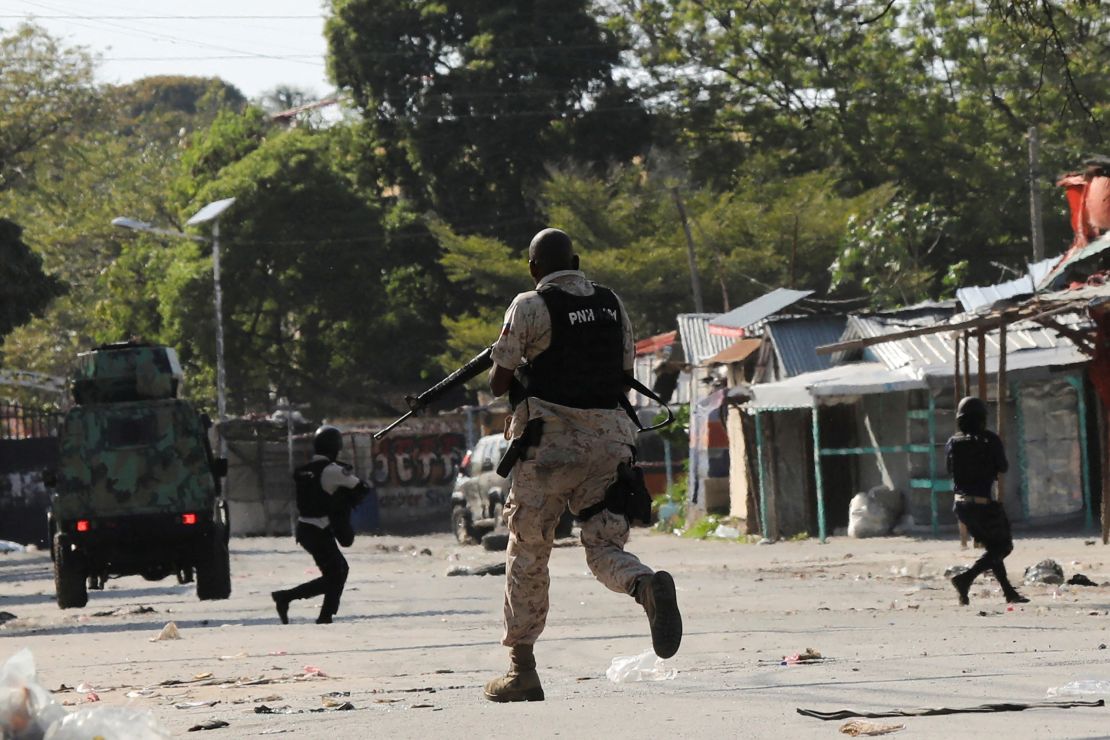
Police officers run holding their guns while confronting a gang in Port-au-Prince, Haiti March 1, 2024. Ralph Tedy Erol/Reuters
‘The country cannot continue like this’
Each year in recent memory has been worse than the last, each catastrophe another blow to the disintegrating Haitian state. In downtown Port-au-Prince, the country’s historic National Palace is still in ruins from Haiti’s devastating 2010 earthquake. Now, multiple courthouses in the area have now been taken over and occupied by gangs.
Many Haitians blame their prime minister for rapidly ceding ground to the gangs over the past three years, while refusing to organize elections that would bring in a new government and give the country a fresh start. Henry and his allies say that the current insecurity would make a free and fair vote impossible, but such explanations do little to appease popular outrage.
Earlier this month, when rumors swirled in one Port-au-Prince neighborhood that a local police station would be closed, fed-up residents quickly spilled into the streets, toppling a bus and burning tires as they called for Henry’s ouster.
“Ariel Henry has to go,” one protester shouted. “We are living in total precarity. We’re living on trash, on sewage. I have nothing, I’m empty. I can’t go to work, I can’t support my family, I can’t send my kids to school.”
Even for some within the gangs, the brutality of the current situation has become unbearable.
“I see people dying in front of me every day,” one 14-year-old gang recruit from the city’s Martissant neighborhood told CNN, visibly distraught, in an interview last month. “The thing I hate the most is when (other gang members) kill someone and they make me burn the body,” he said.
One of his friends, also a gang member, was killed and burned a few days ago, he adds. “I don’t want that to happen to me.” CNN is not naming the teenager due to concerns for his safety.
“The sentiment on the ground is that the country cannot continue like this. The level of violence that people are exposed to is inhumane,” United Nations deputy special representative in Haiti Ulrika Richardson warned in a press briefing in New York Wednesday.
80% of Port-au-Prince controlled by gangs
On TikTok and WhatsApp, accounts flaunting guns and flashy cars tout affiliation with groups like the 5 Segond gang, 400 Mawozo (notorious in the US for the 2021 kidnapping of over a dozen foreign missionaries), and Kraze Barye, whose leader has a nearly $2 million bounty on his head from the FBI.
Haiti’s gangs were once seen as thuggish instruments for powerful politicians and business elites. But today, they seem to have slipped their leashes; the gangs overrunning Port-au-Prince have become independent “violent entrepreneurs,” according to a recent analysis by the Global Initiative Against Transnational Organized Crime.
In an impoverished country with little to exploit, the gangs are treating human beings like commodities, snatching at least 2,490 people off the street last year to trade in a fast-growing kidnapping business, per UN figures.
Victims whose families cannot pay for their release are often killed, adding to the thousands of others who have lost their lives to indiscriminate gunfire, waves of arson, and other abuses. Haiti’s national homicide rate doubled last year, reaching 41 murders for every 100,000 people, the UN says – one of the highest murder rates in the world.
Haiti’s National Police, which boasts an aggressive new anti-gang unit, has seen some success in apprehending some criminal figures and holding back gang expansion in a key areas of the city, including next to the US embassy. But with nearly 100 growing gangs in the metropolitan area, the force just does not have the firepower or training to restore calm to the country, sources say.
According to UN figures, Haitian police are quitting en masse, with 1,663 officers leaving in 2023 alone.
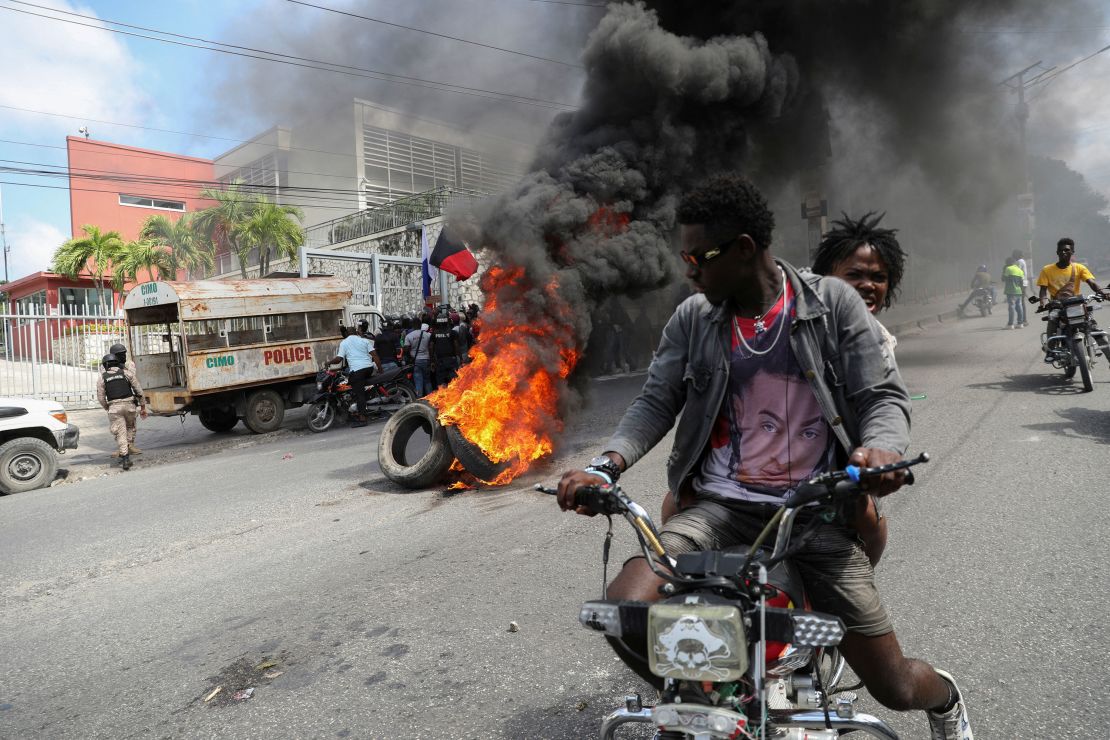
People drive past a burning blockade as demonstrators hold a protest calling for the resignation of Haitian Prime Minister Ariel Henry outside the Canadian Embassy, in Port-au-Prince, Haiti February 25 2024.
As hunger spreads, popular anger grows
One recent morning in the neighborhood of Delmas, dozens of women from the nearby gang-controlled slum of Cité Soleil lined up to receive food handouts from the UN’s World Food Programme, distributed by Catholic charity St. Kizito.
Every person CNN approached said they had been brutalized one way or another; one recounted being raped by a gang member, showing scars on her arm from the attack. A widow said her husband had been burned alive inside their family home during a battle between gangs.
“I was at home with my family, when a rival group to our local gang attacked the neighborhood. I had the time to run with my child, but my husband was too slow behind us. They burned the house down with him inside.”
Over 300,000 civilians have been made homeless by inter-gang warfare, according to the UN.
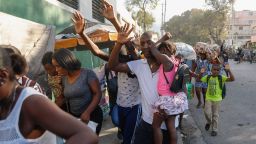
RELATED ARTICLEGunfire near Haiti airport disrupts flights for second day
On the other side of Haiti, in the southern coastal city of Jeremie, an administrator at St. John Bosco school told CNN that at least 20 new students had arrived from the capital with their families since the start of 2024, some fleeing in such a hurry that they brought no clothes or even identification documents.
But in rural areas, the threat is hunger. Gang control of key roads in and around Port-au-Prince has dramatically slowed the transport of vital imported food and fuel across the country. Exorbitant bribes are required for safe passage.
Prices are spiking unsustainably for a population where more than 60% of households live on less than $4 per day, according to World Bank estimates.
One market vendor in Jeremie told CNN that the wholesale price for a sack of sugar had now leapt from the equivalent of $50 to $150. The cost of a bag of rice, a staple in Haitian cuisine, has risen from $40 to $120.
The stress of trying to make ends meet in these conditions is fraying the social fabric. In January, rioters attacked the St. John Bosco school, trying to break down its gates and reach food stocks donated by the UN’s World Food Programme, according to the administrator.
The food was intended for impoverished students’ lunches – often their only meal of the day. But since then, the terrified kids have not come back.
Anger boils over
From the smoke-filled streets of the capital to farmworkers plunging their machetes into the fields in Jeremie, CNN’s team repeatedly heard an angry sing-song refrain: Ariel kraze peyi a, Ariel kraze peyi a. “Ariel is destroying the country.”
Prime Minister Ariel Henry, a neurosurgeon by training, was appointed prime minister in 2021 with the backing of the United States, Canada and other key allies, following the assassination of former President Jovenel Moise.
The job was a poisoned chalice; even then, gangs were estimated to be in control of more than half of Port-au-Prince. Henry vowed to restore order and hold elections, but two and half years later, the world’s first free Black republic is further than ever from those democratic fundamentals. Haiti’s last elections were in 2016, so most terms have long since expired, leaving elected offices vacant – including the presidency and the entire legislature.
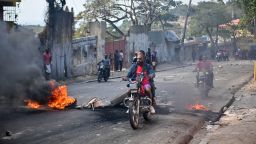
It’s a fertile landscape for political opportunists. Earlier this month, Guy Philippe, a rebel leader who was recently repatriated by the United States to Haiti after serving time for money laundering, called for a revolution. Accompanying him in some videos were members of the Haitian Environment Ministry’s security brigade (BSAP), raising fears of a state security force gone rogue.
“We are battling to change a system which is not working for any Haitian, in which no one can live, no matter who they are… We are loyal to the government, but it is not loyal to us,” one BSAP commander, Inspector Odric Octina, told CNN.
“Any revolution that can free the Haitian people from this dictatorship, we are ready to stand with it,” he said, adding the caveat that BSAP does not intend to turn their arms against the government and that his only action so far had been to participate in protests in Port-au-Prince.
The gangs meanwhile have shown no qualms about attacking government institutions directly.
As armed groups pounded the National Penitentiary, one of Haiti’s police unions posted a desperate message to X on Saturday, pleading for reinforcements. If the prison’s detainees are released to join gangs already at large, the union warned, “we are done. No one will be spared in the capital.” But by the end of the day, the prison had been opened; over 3,500 prisoners are thought to have escaped, according to UN estimates.
Violence continued throughout the weekend, with Haiti’s government on Sunday announcing a state of emergency in the West department, where Port-au-Prince is located, and a curfew from 6pm to 5am in an effort to “regain control of the situation.”
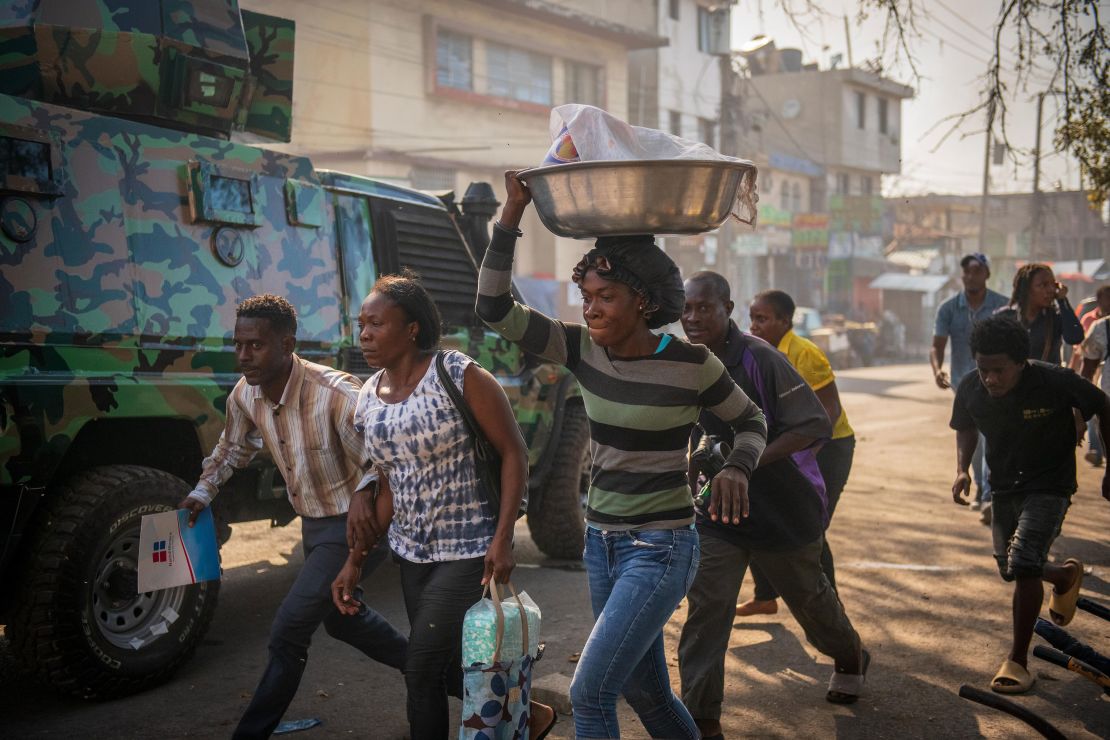
People run down a street in Port-au-Prince, Haiti, on February 29. Johnson Sabin/EPA-EFE/Shutterstock
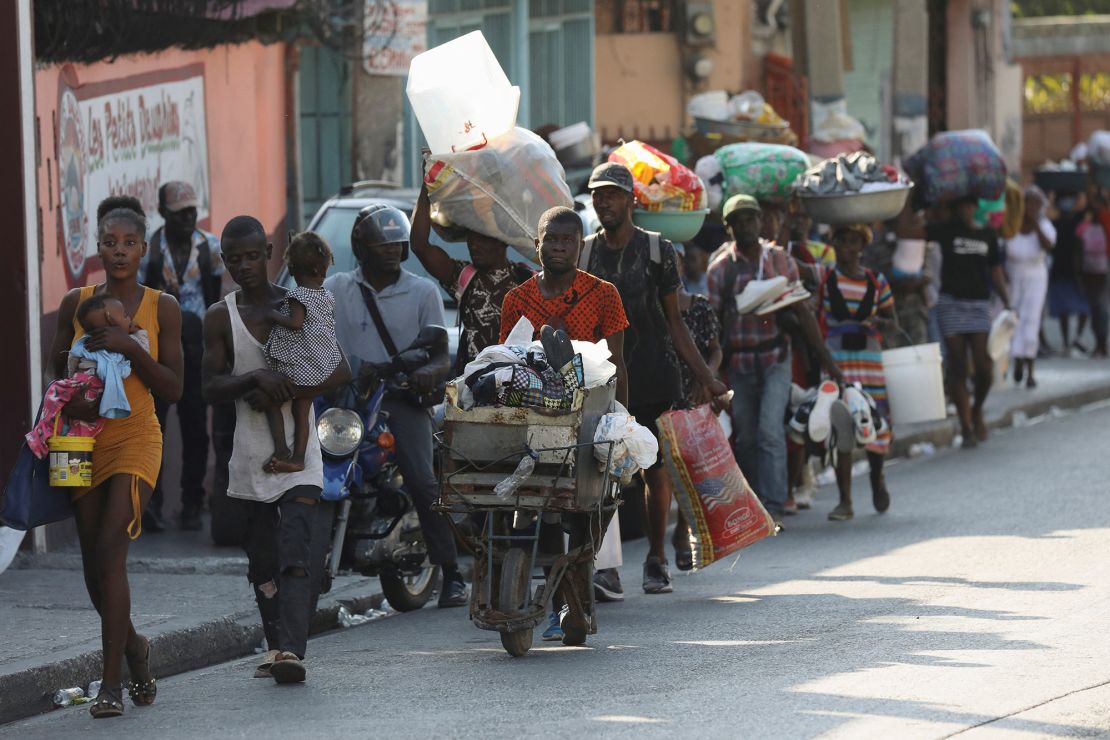
People flee their homes as police confront armed gangs in Port-au-Prince, Haiti, February 29, 2024.
Hope in a foreign uniform
February 7 was the date that a new elected government should have taken power in Haiti, per an agreement between Henry’s government and a coalition of influential figures from Haiti’s civil society and business sector.
But the necessary elections were never held, so Henry last month could offer only a rare national address asking for patience as the deadline came and went, telling citizens it is time to “put our heads together to save Haiti.”
“The principal task of this transitional government is to create the conditions in which elections can be organized,” he assured viewers.
“My interim government is working hand-in-hand with the police to restore normal life in the country. We are aware that many thing have to change, but we need to make those changes together and calmly,” he also said.
A new transition deadline has already been proposed: Last week, the leaders of regional bloc Caricom said in a statement Henry had agreed to hold general elections no later than August 31, 2025.
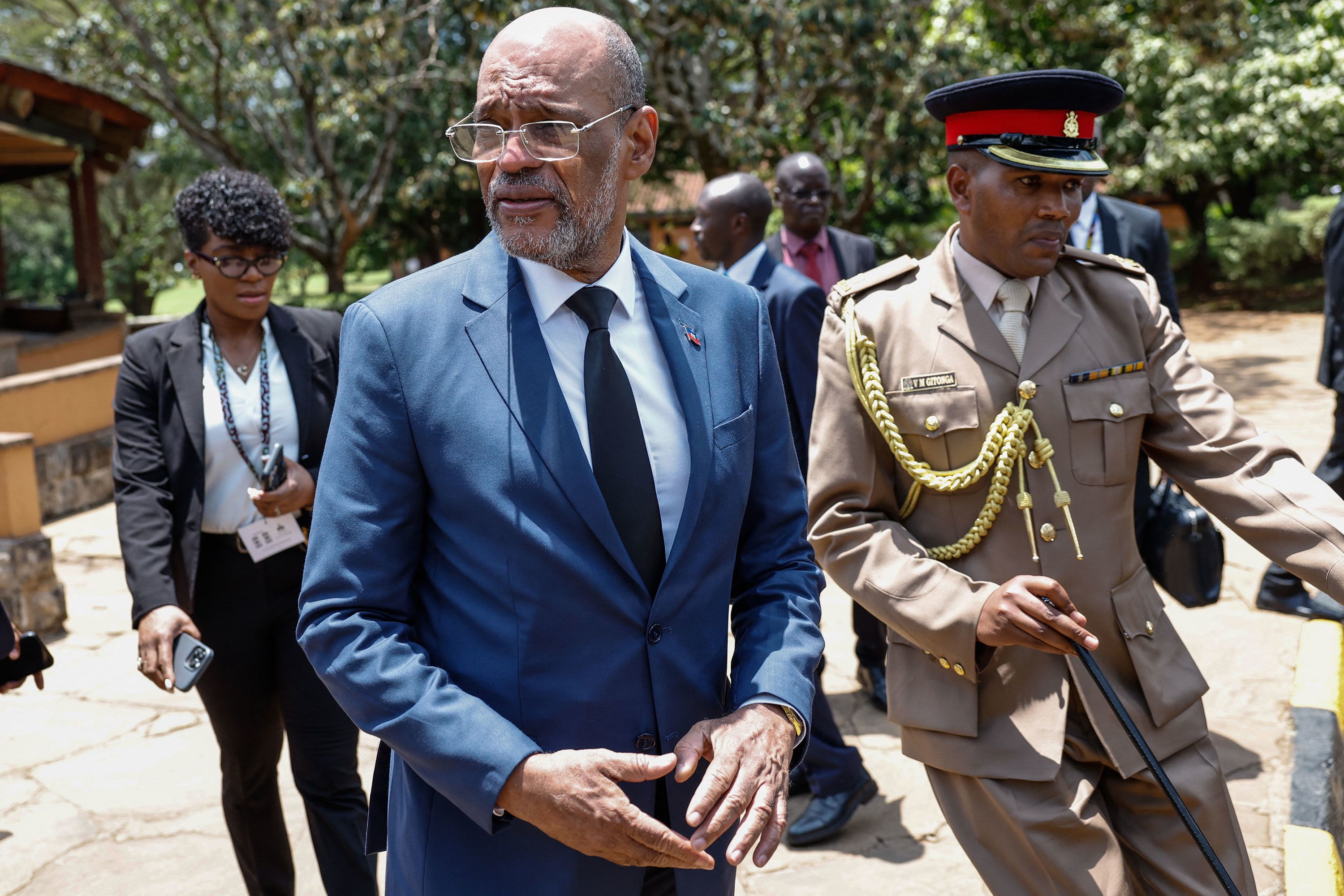
Haitian Prime Minister Ariel Henry at the United States International University Africa, in Nairobi on March 1, 2024.
Until then, Henry’s best hopes may rest on an outside solution over which he wields little control: The Kenyan-led “military support” force requested by his government last year and greenlit by the United Nations Security Council.
“The reason why the Prime Minister requested the UN resolution back in October 2022 is because the police department and other forces cannot challenge the gangs,” Henry’s advisor Jean Junior Joseph told CNN.
Anger toward the government for Haiti’s gangs problem is misplaced, he also said, emphasizing that the government has limited options.
“The situation is so complicated that the gangs have more ammunition than us,” he said.
The Prime Minister’s office declined CNN’s request for an interview.
Foreign military interventions are viewed with deep skepticism in Haiti, where UN peacekeepers are synonymous with sex abuse scandals and the deadly introduction of cholera. How exactly the Kenyan-led mission will operate and what kind of human rights precautions its forces will take remain unclear.
Still, Haitian security forces interviewed by CNN say they welcome the help. The United States – a top destination for Haitian migrants fleeing the country’s turmoil – has also eagerly backed the mission with a promise of $200 million.
It may be no coincidence that the latest wave of gang violence began while Henry was in Nairobi last week to sign an agreement underpinning the mission.
The stakes are high: If the promised 1,000-plus troops are delivered, the foreign muscle is expected to pose a serious challenge to gang control – potentially renewing hope for change in the country and buying time for the embattled premier.
But if the mission does not come soon, experts and government insiders warn that mounting pressure over Haiti’s unbearable violence is likely to explode.
Haiti gangs demand PM resigns after mass jailbreak
Haiti’s government declared a 72-hour state of emergency on Sunday after armed gangs stormed a major prison. At least 12 people were killed and about 3,700 inmates escaped in the jailbreak.
Gang leaders are demanding the resignation of Prime Minister Ariel Henry, whose whereabouts are unknown since he travelled to Kenya.
Gangs control around 80% of the capital, Port-au-Prince.
Gang violence has plagued Haiti for years.
A government statement said two prisons – one in Port-au-Prince and the other in nearby Croix des Bouquets – were stormed over the weekend.
It said the acts of “disobedience” were a threat to national security and said it was instituting an immediate night-time curfew in response, which started at 20:00 local time (01:00 GMT on Monday).
Haitian media reported that police stations were attacked, distracting authorities before the coordinated assault on the jails.
Among those detained in Port-au-Prince were suspects charged in connection with the 2021 killing of President Jovenel Moïse.
In the capital, gangs have erected barricades to prevent security forces from encroaching on their territory, while their strongholds in Port-au-Prince’s vast shantytowns are still largely on lockdown.
Schools and many businesses are closed, and there are reports of looting in some neighbourhoods.
Police have set up roadblocks and there is much uncertainty on the streets.
The latest upsurge in violence began on Thursday, when the prime minister travelled to Nairobi to discuss sending a Kenya-led multinational security force to Haiti.
Gang leader Jimmy Chérizier (nicknamed Barbecue) declared a co-ordinated attack to remove him.
“All of us, the armed groups in the provincial towns and the armed groups in the capital, are united,” said the former police officer, who is accused of being behind several massacres in Port-au-Prince.
Haiti’s police union had asked the military to help reinforce the capital’s main prison, but the compound was stormed late on Saturday.
On Sunday the doors of the prison were still open and there were no signs of officers, Reuters news agency reported. Three inmates who tried to flee lay dead in the courtyard, the report said.
A journalist for the AFP news agency who visited the prison saw around 10 bodies, some with signs of injuries caused by bullets.
One volunteer prison worker told the Reuters news agency that 99 prisoners – including former Colombian soldiers jailed over President Moïse’s murder – had chosen to remain in their cells for fear of being killed in crossfire.
They have now been transferred to a different prison.
The US embassy in Port-au-Prince on Sunday urged its citizens to leave Haiti “as soon as possible”. The French embassy said it was closing visa services as a “precaution”.
While Haiti has been plagued by gangs for years, the violence has further escalated since President Moïse’s assassination at his home in 2021. He has not been replaced and presidential elections have not been held since 2016.
Under a political deal, Mr Henry was due to stand down by 7 February. But planned elections were not held and he remains in post.
A spokesperson for the White House’s National Security Council said it was “monitoring the rapidly deteriorating security situation” with “grave concern”.
They said the path forward “lies with free and fair elections” and violence serves “only to delay a democratic transition while… upending the lives of thousands”.
Speaking to the BBC’s Newsday, Claude Joseph – who was serving as acting prime minister when President Moïse was assassinated and who is now head of the opposition party called Those Committed to Development – said Haiti was living through a “nightmare”.
Mr Joseph said Prime Minister Henry wanted “to stay as long as possible in charge”.
“He agreed to step down on 7 February. Now he decides to stay, despite the fact that there are huge protests throughout the country asking him to step down – but it’s unfortunate that now those criminals are using violent means to force him to step down.”
In January, the UN said more than 8,400 people were victims of Haiti’s gang violence last year, including killings, injuries and kidnappings – more than double the numbers seen in 2022.
Many health facilities have stopped operating because of the bloodshed.
Anger at the shocking levels of violence, on top of the political vacuum, have led to several demonstrations against the government, with protesters demanding the resignation of the prime minister.
“If Ariel Henry doesn’t resign, if the international community continues to support him, we’ll be heading straight for a civil war that will lead to genocide,” Cherizier, a former police officer who is under U.N. sanctions for human rights abuses, told reporters in the capital.
“Either Haiti becomes a paradise or a hell for all of us. It’s out of the question for a small group of rich people living in big hotels to decide the fate of people living in working-class neighborhoods,” the 46-year-old added.
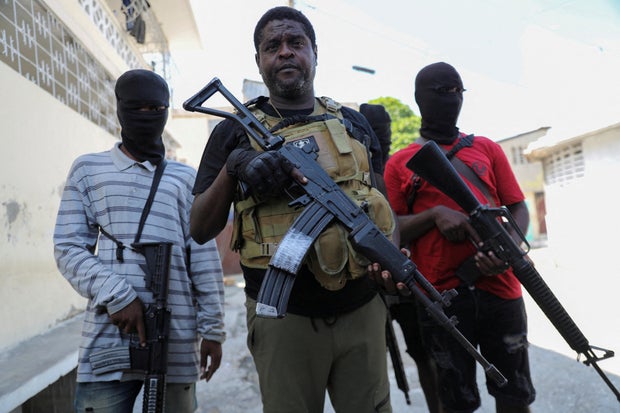
Former police officer Jimmy “Barbecue” Cherizier, leader of the ‘G9’ gang alliance, is flanked by gang members after a press conference in Delmas 6, Port-au-Prince, Haiti March 5, 2024.
As the latest crisis in the violence-wracked Caribbean nation spiraled, gunfire shut down some flights at Toussaint Louverture International Airport in Haiti’s capital.
Haiti gangs threaten ‘civil war’ as unrest spreads
Jimmy “Barbecue” Chérizier made the threat as members of his gang tried to seize the capital’s airport
The gang leader behind the violence blighting the Haitian capital has warned there will be a “civil war” if Haiti’s prime minister, Ariel Henry, does not step down.
Jimmy “Barbecue” Chérizier made the threat as members of his gang tried to seize the capital’s airport to stop Mr Henry from returning from abroad.
The UN High Commissioner for Human Rights Volker Türk said the situation was “beyond untenable”.
Thousands of Haitians have had to flee.
Aid groups say about 15,000 people, among them many young children, have been displaced from their homes in recent weeks.
Mr Türk said that since the beginning of the year, “a staggering 1,193 people have been killed, and 692 others injured by gang violence”.
He urged the international community to “act swiftly and decisively to prevent Haiti’s further descent into chaos”.
According to the Miami Herald newspaper, the US state department is pressuring Prime Minister Henry to resign.
The paper reports that US officials conveyed their message to Mr Henry as he was in mid-air during his attempt to fly back to Haiti on Tuesday.
Mr Henry’s whereabouts had been unknown for days until late on Tuesday, when he boarded a charter flight in New Jersey.
Reports said Mr Henry had planned to land in the Haitian capital of Port-au-Prince, but with the airport closed due to the gangs’ attempts to seize it, and neighbouring Dominican Republic turning the plane away, the pilot eventually landed in the US territory of Puerto Rico.
Haitian media report that Mr Henry is now seeking alternative routes back into the country while diplomatic pressure appears to be mounting on him to agree to a transitional government.
Asked about the Miami Herald’s report, US ambassador to the UN Linda Thomas-Greenfield said: “What we have asked the Haitian PM to do is to move forward on a political process that will lead to the establishment of a Presidential Transitional Council that will lead to elections.”
Meanwhile, tension remains high in Haiti, with Jimmy “Barbecue” Chérizier warning on Tuesday that “if Ariel Henry does not resign … we’ll be heading straight for a civil war that will lead to genocide”.
The G9 alliance which he leads has unleashed a wave of violence, including attacks on police stations and the storming of the country’s two main prisons. Thousands of inmates escaped in a mass jailbreak on Saturday.
Haiti has been blighted by gang violence for years. But while Prime Minister Henry was on a visit to Kenya last week, Barbecue escalated the violence.
Mr Henry was aiming to agree a deal for Kenya to lead a multinational police operation to quell the violence in Haiti.
Barbecue fears Mr Henry would use the forces to stay in power.
The gang leader has been opposed to the prime minister since he took over power shortly after the assassination of President Jovenel Moïse in July 2021, without an election.
Critics of Mr Henry argue his rule is illegitimate. They also point to the fact that two and a half years after coming to power he has still not organised presidential elections, as he had originally promised.
The prime minister has not spoken publicly since the violence erupted. He has only retweeted the declaration of the state of emergency decreed by one of his ministers in his absence.
It is not clear what gang leader Barbecue’s longer term aims are. On Tuesday he urged Haitians “to unite”.
“Either Haiti becomes a paradise for all of us, or a hell for all of us,” he told journalists, wearing a bullet-proof vest.
In the past he has suggested created a “council of elders”, a group of civil society representatives from different regions, to replace the prime minister.
Haiti has no elected government officials. No elections have been held since 2016 in the country.
The vacuum created by the lack of elected officials has been filled by gangs, who are estimated to control around 80% of the capital.
Kidnappings for ransom are common and many schools and hospitals have had to close due to the lack of security.
Medical charity Médecins Sans Frontières (MSF) said it had to temporarily suspend its mobile clinics in several sites.
“We fear we will run out of medicines and medical supplies, which are absolutely essential to meet the enormous needs we are facing at the moment,” MSF head of mission Mumuza Muhindo Musubaho said.
Violence has so far been mainly concentrated in the capital and its environs. But there have also been reports of shootings in the town of Jeremie, in the south west, and of a prison riot in Jacmel in the south.
The United Nations Security Council said it would hold an emergency meeting later on Wednesday to discuss the violence.
